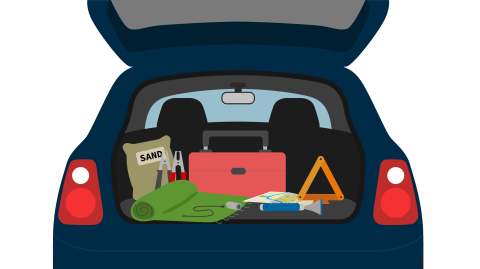Stay Safe During Winter Travel
Travel during the winter has unique risks, especially if you travel by car. Being prepared can help you “expect the unexpected” so your trip isn’t ruined by common problems travelers face in the winter.
Know before you go
- From blizzards, to avalanches, to ice storms, be aware of the winter risks in places you visit. Check the local weather forecasts and warnings before heading out. Visit National Weather Service for up to date forecasts and download the FEMA App for alerts in up to five locations.
- Check your local weather and traffic reports before heading out.
- If your roads are not in good shape, consider postponing non-essential travel until the roads are cleared. If you do have to go out, make sure you are prepared in case you become delayed while traveling.
- Tell others your route and anticipated arrival time.
- Want more tips on travel safety? Watch this PSA, made in partnership with FEMA and the TSA, for additional tips on travel safety.
On the Road
- Make sure your vehicle is in good working condition before you travel.
- Keep your gas tank as full as you can. A full tank will also keep the fuel line from freezing.
- Install good winter tires and make sure they have enough tread, or any chains or studs required in your local area.
- When driving, increase your following distance from 3-4 seconds to 5-6 seconds. It takes longer to slow down and stop on icy roads.
- Every vehicle should have an emergency supply kit in the trunk. Kits should be checked every six months and expired items should be replaced regularly.
- Keep family and emergency phone numbers, including your auto insurance provider and a towing company in your phone.
- Consider keeping a power bank for your phone in your car in case your car loses power.
- If stranded, run the engine for about 10 minutes per hour to run the heater and charge your cellphone. Open a window slightly to let fresh air in and avoid carbon monoxide (CO) poisoning.


